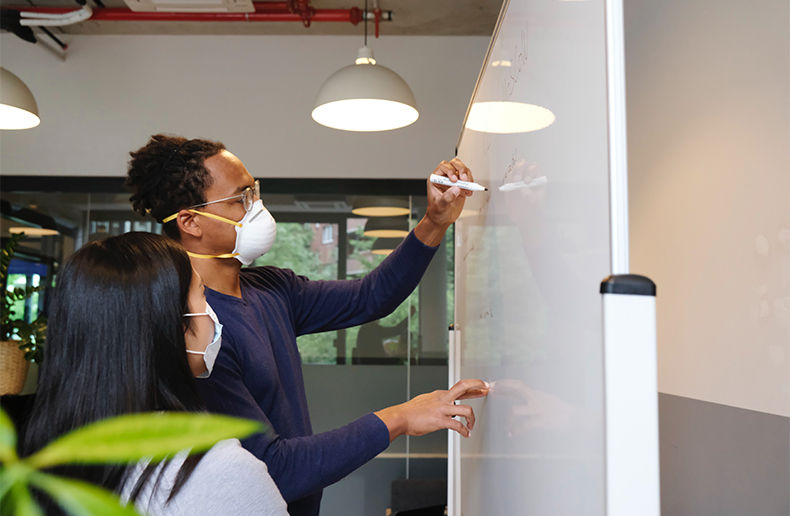This article is a Magazine Supplement for the October issue of the Insurance Journal.
The pandemic has changed the way a lot of people are thinking. The degrees of logic and emotion your clients are working with to make their decisions are shifting, and there are larger trends at work as well, hugely influencing the way they think about and work with those who serve them.
Understanding trends and embracing them is essential to do if you want to exceed or even just meet customer and client expectations. Understanding trends will also help you to differentiate yourself from the competition and stay relevant in a world where attitudes and values have changed, says Daniel Levine, trends expert, executive director of the Avant- Guide Institute and presenter at the recent Million Dollar Round Table (MDRT) virtual conference.
“If you do not know what your customers are expecting, how can you exceed that? How can you even match it?” - Daniel Levine
He says things are changing, minds and attitudes are changing, and values are changing, and all of this has occurred in a very short period of time. “Values are changing all the time and they have changed in a big way since the beginning of this year,” he told MDRT delegates gathered to watch his online presentation. “If you do not know what your customers are expecting, how can you exceed that? How can you even match it?”
Levine tapped his research to provide delegates with insights into three trends, occurring right now, that are causing change – some of which will likely be with us to stay for good.
Wellness
“Emotional wellness is huge right now. A lot of companies understand that,” Levine says, pointing out that the most popular class at Yale University right now focuses on the science of well-being. He adds that trends in everything from beverages to architecture reflect a similar desire to respond to the need for wellness. “It is in the ethos,” he says.
“Use the language of wellness with your customers,” he adds. “I am bringing this to you because I think the insurance industry has been particularly slow to embrace the trend of wellness, which is strange, because that is exactly what you are selling. The product is exactly that. It helps people but the industry as a whole has not been using that language as much as they can. Right now offers a very unique opportunity to bring this into the forefront of your marketing.”
Technology
The use of personal technology has accelerated notably as a result of the pandemic, with nearly every interaction moving online. Telemedicine has blossomed in a very short period of time, for example, and it’s now here to stay. More, Levine says one-fifth of all personal sales will take place online by 2023. This is much sooner than earlier research, conducted just months before the pandemic, which originally suggested it might take until 2025 to reach the same numbers.
“Telemedicine is an excellent example of how quickly, number one, COVID-19 has changed our behaviour, and two, how once people’s behaviour changes, it often changes for good,” he says.
More, he says companies that provide 24/7 sales and support have put pressure on other businesses to up their game and offer faster, quicker, personal service. “One way to do that is by helping customers help themselves,” he says, adding that even a frequently asked questions page can go a long way to help the customer who is perusing your services at 3 a.m.
Given the developments in personal technology and the fact that everything has moved online with great speed in just a few short months, he recommends advisors and representatives take stock and think of ways to make the business even more touchless and think of ways to help customers, even at 3a.m. “What technology will help make our client’s lives easier?” he asks. “How can we be even easier to contact and work with? People are looking to work with companies that make their lives easier.”
Institutional trust
Finally, he says institutions around the world are losing people’s trust, and it’s only getting worse. Fake audio and video, emissions scandals by car companies, doping scandals, massive data breaches and more, he says are just a few examples of the thousands he can point to from companies across the industrial spectrum. “Trends are not siloed by industry,” he says. “When people are losing trust in one part of the world, it sort of brings everybody down.”
Against this backdrop, however, he says there is a real opportunity for financial professionals to stand out. “There is a benefit here. It is a wonderful time to embrace this trend and boost your credibility because everyone else around you is losing it,” he says. “There is a real opportunity for finance industry professionals right now. It is a unique opportunity to create more trust.”
Do this, he says, by being more clear, open and honest with clients. “We cannot be as opaque as we have been in the past.”
“What can we share about ourselves to engender trust?” he asks. “Transparency gives people a sense of trust. If you are clearer about who you are and the services you sell, customers will feel more trust.”







